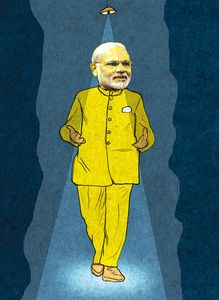Narendra Modi’s appearance in a monogrammed suit at the tea he hosted for Barack Obama three years ago created much mirth and derision. The scene reminded many of Malvolio appearing in yellow stockings and cross-garters in Twelfth Night, and provoked the best quip ever from Rahul Gandhi. He scoffed at the Modi regime as “suit-boot ki sarkar”.
Modi has since sold the suit, and got himself a genteel wardrobe. His clothes these days are of the kind which Jeeves would have approved for an Indian Bertie Wooster, a Bharat Vastrakar.
All the same, the suit-boot label has stuck. Modi’s critics—Congressmen, Communists & c—have since been making much of his proximity to the Adanis and the Ambanis, and of the distance the regime keeps from the aam aadmis. They have been debunking his economic policy as crony capitalism, a term that George Tabel claims to have coined in 1980 while giving headline to a colleague’s article in Time.
The critics draw much from the opaqueness in the Modi government’s business deals. The regime can’t explain why they hijacked the Rafale plane from the public sector Hindustan Aeronautics who have been making warjets since the 1960s, and gave it to the Ambanis who haven’t made a toy plane yet. The government can’t explain why the Ambanis’ Jio University was honoured and haloed, even before the tycoons constructed a classroom or bought a blackboard.
There is more. The Modi government’s lack of interest (or lack of skill, to be charitable) in solving peasants’ problems, in aiding the note ban-hit small traders, in assisting the GST-hit small businesses, and in stopping the mobs who lynch dalits and Muslims have all led to a perception—right or wrong—that Modi cares only for moneybags.
Modi, too, has to share the blame personally. He has been indiscreet in choosing the company he keeps, as he had been in selecting the clothes he wears. Fraudster Nirav Modi was photographed among those who feted him at Davos. The Ambanis printed his picture in their promotion pamphlets, and he hasn’t said a word till date.
But trust Modi to turn any table, or change any narrative. Instead of squirming at being called suit-boot ki sarkar, he has signalled to his partymen to wear the suit-boot label on their sleeves. Like Calvin Coolidge who said America’s business is business, Modi has made it clear that businessmen aren’t all thieves and robbers, but also nation-builders. “You don’t get tainted by standing with anybody,” he declared at an entrepreneurs’ event in Lucknow the other day. “We aren’t... scared of standing next to businessmen.... Those people are scared—the ones who don’t meet industrialists in public but do everything behind the curtains.... Don’t we know in whose airplanes they fly around?” Then he invoked the most sacred name in Indian politics: “Gandhiji didn’t hesitate to stay with the Birlas.”
Most PMs had their funders and favourites—in the open or in the closet—but the whole issue is about the optics. Jawaharlal Nehru was close to the Tatas, and got them to send cheques not only to the Congress treasury but also to Homi Bhabha’s atomic lab. And Nehru didn’t scowl when the Tatas also sent cheques to the opposition Swatantra.
Indira Gandhi had a disdain for the boxwallah barons, but encouraged new money. The old-moneyed Charat Rams (DCM) and the Nandas (Escorts) faced takeover threats from the pound-plenty Swraj Paul under her regime, while the new-moneyed Ambanis and the Ruias got richer. Only V.P. Singh hunted them all, as FM and PM—the boxwallah ITC, the old-moneyed Birlas, the thread-tyre-tobacco Modis, Orkay’s Kapal Mehra, and the respected Kirloskars and Bajajs. Some even went to jail.
No wonder VP lasted hardly a year as PM.
prasannan@theweek.in


